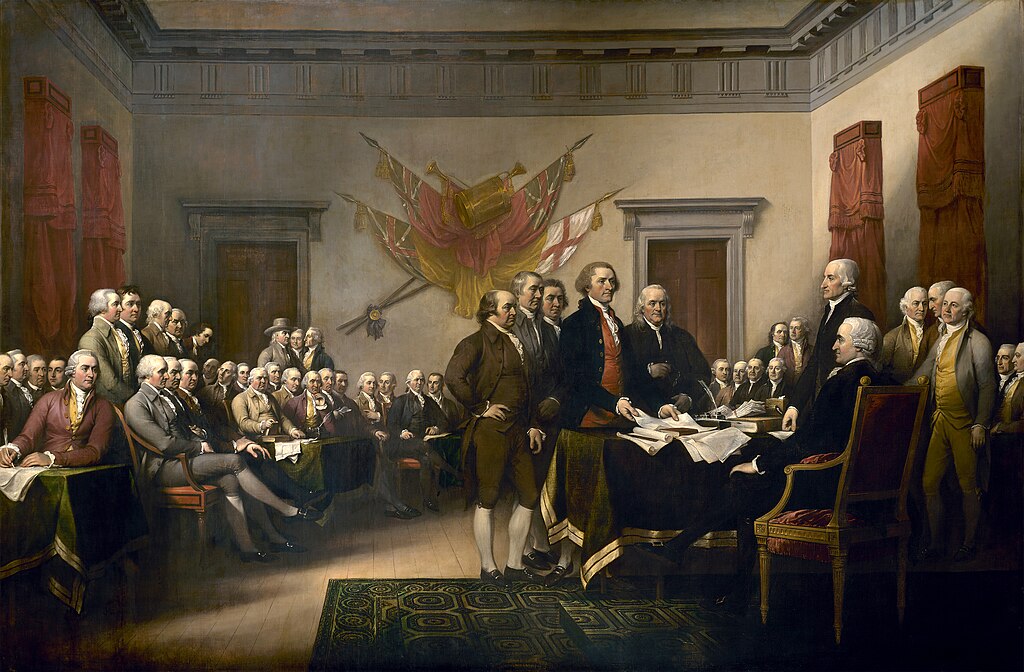The Harlan Institute’s 14th Annual Virtual Supreme Court Competition: Patriots v. Loyalists

The Harlan Institute is pleased to announce the fourteenth annual Virtual Supreme Court Competition. This competition offers teams of two high school students the opportunity to do cutting-edge research on constitutional law, write compelling appellate briefs, argue against other students through video chats, and try to persuade a panel of esteemed attorneys during oral argument that their side is right. This year, in honor of America’s 250th birthday, the competition will focus on the case of Patriots versus Loyalists.
Before the Honorable Continental Congress
Date of the plea: July 3, 1776

Presentation of the case
In honor of America’s 250th birthday, the Harlan Institute will host a very special Virtual Supreme Court competition for the October 2025 term. We will reenact the independence debates in the form of a moot court competition. Teams of two high school students will plead in court for And against independence through written and oral advocacy. The two best advanced teams will present their pleadings in the case of In Re Declaration of Independence before a panel of federal judges in a very special place.
Coaches can register their teams for Institute of Competition Sciences.
Question presented:
Should the United Colonies declare independence from Britain?
Primary sources
This is a “closed” competition. Students will be limited to the use of the following primary sources that existed before July 4, 1776. Students cannot rely on the benefit of hindsight or knowledge of what happened after the adoption of the Declaration of Independence.
Before 1773
- 1690 – John Locke’s second treatise on government – Chapters XVII (Of usurpation), XVIII (Of tyranny), XIX (Of the dissolution of government)
- March 22, 1765 – The stamp lawpassed by the British Parliament
- May 29, 1765 – Virginia makes decision on Stamp Actby Patrick Henry
- October 19, 1765 – Resolution of the Continental Congress in response to the Stamp Act (“The Stamp Act Congress”)
- March 18, 1766 – Act repealing the Stamp Act by the British Parliament
- 1768 – Letters from a Pennsylvania Farmer to the People of the British Colonies concerning the Stamp Act by John Dickinson
- March 1770 – The Bloody Massacre (Boston) by Paul Revere
- November 20, 1772 – Settlers’ rightsSamuel Adams (Boston Committee of Correspondence)
1773
- March 12, 1773 – Virginia Resolutions Establishing a Committee of Correspondence
- April 9, 1773 – Correspondence Committee (Transcription), Boston
- May 10, 1773 – Tea Law Resolution by the British Parliament
- May 28, 1773 – Resolutions of the Massachusetts House of Representatives accepting the Virginia proposal
- October 16, 1773 – The Philadelphia Resolutions in response to the tea law
- November 29, 1773 – Boston residents meet at Faneuil Hall to prevent the sale of East Indian Company tea
- December 16, 1773 – Tea, destroyed by the Indians
- December 17, 1773 – Journal of John Adams after the Boston Tea Party
1774
- March 31, 1774 – The Boston Harbor Act in response to the Boston Tea Party, by the British Parliament
- May 13, 1774 – Circular letter from the Boston Committee of Correspondence
- May 20, 1774 – The Massachusetts Government Actby the British Parliament
- May 20, 1774 – The Administration of Justice Act
- May 20, 1774 – The Mecklenburgh Resolutions (North Carolina)
- May 23, 1774 – Letter from the New York Committee of Fifty-One to the Boston Committee of Correspondence
- May 27, 1774 – Association signed by 89 members of the late Virginia House of Burgesses
- June 2, 1774 – The cantonment lawby the British Parliament
- July 1774, A summary view of the rights of British Americaby Thomas Jefferson
- July 18, 1774 – Fairfax County, Virginia resolves
- July 19, 1774 – Proceedings of the correspondence committeenew York
- September 9, 1774 – Suffolk (Massachusetts) decides
- September 9, 1774 – Heads of Grievances and RightsContinental Congress
- September 30, 1774 – Motion on non-export and defenseContinental Congress
- October 10, 1774 – Message to General GageContinental Congress
- October 14, 1774 – Declaration and Resolutions of the First Continental Congress (The Bill of Rights; a list of grievances)
- October 20, 1774 – General Gage’s response
- October 20, 1774 – Continental AssociationContinental Congress
- December 1774 – Novalanglus (John Adams) and Massachusettensis (Daniel Leonard)
- 1774 – Considerations on the nature and extent of legislative power by James Wilson
- 1774 – A very short and frank appeal to free-born Britonsan anonymous pamphlet
1775
- January 13, 1775 – Address to the New Jersey Provincial Assemblyby Governor William Franklin
- March 22, 1775 – Speech of Edmund Burke, Esq. On the proposal of its conciliation resolution with the colonies
- March 23, 1775 – Give me freedom or give me deathPatrick Henri
- July 6, 1775 – A Declaration of the Representatives of the United Colonies of North America, now assembled at the Congress of Philadelphia, setting forth the causes and necessity of their taking up arms by the Continental Congress
- July 8, 1775 – Olive Branch Petition from the Continental Congress to the King
- July 31, 1775 – ResolutionContinental Congress
- August 23, 1775 – A Proclamation to Suppress Rebellion and Sedition by King George III
- November 9, 1775 – Secrecy agreement adopted by the Continental Congress
- November 9, 1775 – Instruction to Congress DelegatesThe Pennsylvania Assembly
- 1775 – Taxation, no tyrannyby Samuel Johnson
- 1775 – Tyranny unmasked: a response to a late pamphlet entitled Taxation no Tyranny
1776
- January 10, 1776 – Common sense by Thomas Paine
- March 1776 – The pure truth by James Chalmers (Candidus), a response to Common Sense
- April 12, 1776 – Halifax, North Carolina decides by the North Carolina Assembly
- May 13, 1776 – Notes from the debates of the Continental CongressJohn Adams
- May 15, 1776 – Preamble to the resolution on independent governmentsContinental Congress
- May 15, 1776 – Virginia Convention resolutions calling for independence
- June 7, 1776 – Jefferson’s Notes on the Proceedings of the Continental Congress
- June 7, 1776 – Lee Resolution presented by Richard Henry Lee
- June 10 and 11, 1776 – Journal of the Continental Congress
- Draft Declaration of Independence
- June 14, 1776 – Instruction to Congress DelegatesThe Pennsylvania Assembly
- June 28, 1776 – Journal of the Continental Congress
- June 29, 1776 – Constitution of Virginia
- July 1, 1776 – Journal of the Continental Congress
- July 1, 1776 – Arguments against the independence of these colonies by John Dickinson (Manuscript)
- July 1, 1776 – Journal of John Adams
- July 1, 1776 – From John Adams to Samuel Chase
- July 2, 1776 – Journal of the Continental Congress
- July 4, 1776 – Journal of the Continental Congress
Preliminary round
Deadline: November 20, 2025 (11:59 p.m. ET)
All teams are invited to participate in the preliminary round. There will be a written component and an oral component. Submissions will be scored on this basis section.
Written component
Teams will be asked to answer the following ten questions in a neutral and objective manner. At this stage of the competition, the teams have not yet decided for or against a position. Each response must be at least 200 words but no more than 1,000 words and must cite at least two primary sources. This competition is “closed” and students may not cite any other sources. Proofread the assignment carefully for spelling, grammar, and usage. The use of generative AI is forbidden. Teams that have used AI will be immediately disqualified.
- Discuss the role that the Stamp Act played in Britain’s relations with the colonies from 1765 to 1772.
- Discuss how the colonies, and particularly the Committee of Correspondence, responded to the Tea Act Resolution of 1773.
- Discuss how the colonies responded to the Intolerable Acts of 1774 (the Boston Port Act, the Massachusetts Government Act, and the Quartering Act).
- Discuss how the actions of the Continental Congress in 1774 caused the colonies to declare their independence.
- Describe the arguments made by patriots in pamphlets, speeches, and other writings from 1774 to 1776 in support of the Declaration of Independence.
- Describe the arguments made by Loyalists in pamphlets, speeches, and other writings from 1774 to 1776 that opposed the Declaration of Independence.
- Discuss the Continental Congress’ reconciliation efforts with Great Britain in 1775.
- Discuss the deliberations of the Continental Congress of June and July 1776 that led to the Declaration of Independence.
- Discuss how the text of the Declaration of Independence changed through different versions in June and July 1776.
- Discuss the writings, speeches, and other sources that influenced the Declaration of Independence.
Oral component
The teams will be invited to present their ten questions in the form of an oral argument. Each student will answer five questions. Students should avoid reading prepared remarks (whether on paper or on a device) and should maintain eye contact. These recordings will be uploaded to YouTube. The recording must last at least fifteen minutes.
The semi-final
Deadline: January 29, 2026 (11:59 p.m. ET)
Teams that qualify for the semi-final will be asked to prepare a “Petitioner” memory on behalf of the Patriots in favor of independence. Teams will use it model. The dissertation must address at least the following seven topics: (i) the Stamp Act; (ii) the tea law; (iii) intolerable acts; (iv) writings in favor of independence; (v) loyalist writings opposed to independence; (vi) attempts at reconciliation; and (vii) whether the Declaration of Independence should be adopted.
Oral arguments will be scheduled on Zoom during the week of February 10.
The round of 16
Deadline: March 19, 2026 (11:59 p.m. ET)
The top eight teams that advance will be asked to prepare a “response” brief on behalf of loyalists opposed to independence. The teams will use the same model.
Oral arguments will be scheduled on Zoom during the week of March 23.
The round of 16
The top eight qualified teams will compete in the round of 16 during the week of April 6, 2025.
The championship round
The top two teams will advance to the championship round which will take place in Washington, DC, at a very special venue, in late April or early May. The Harlan Institute will cover airfare and hotel for students and up to two chaperones per team.



